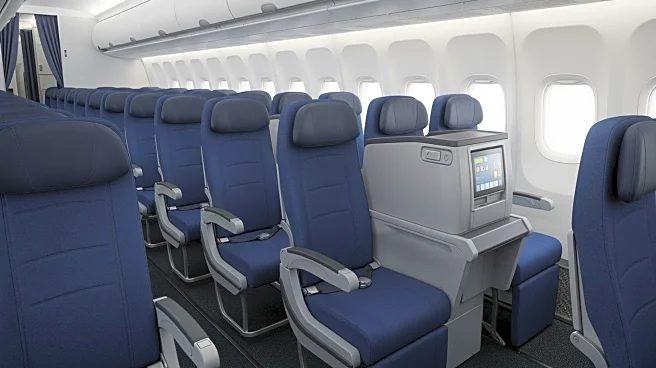What's Happening?
WestJet Airlines has announced a significant reconfiguration of its economy cabins on Boeing 737-8 MAX and 737-800 aircraft. The Canadian airline, which operates flights to 20 U.S. states and Washington,
D.C., is introducing a 'fixed recline' design for standard seats, aimed at preserving personal space for passengers. This change allows WestJet to add an extra row of seats, thereby reducing the cost per seat and offering more affordable fares. The new seating options include Extended Comfort and Premium cabins, where reclining seats will be available. Samantha Taylor, WestJet's Executive Vice-President and Chief Experience Officer, emphasized the airline's commitment to providing diverse seating options to cater to different passenger preferences. The overhaul also includes the installation of improved, high-speed Wi-Fi across the fleet, free for WestJet Rewards members.
Why It's Important?
The cabin reconfiguration by WestJet is a strategic move to maintain competitive pricing in the airline industry, particularly in the U.S. market. By reducing the cost per seat, WestJet aims to offer more affordable airfares, potentially attracting budget-conscious travelers. The introduction of fixed recline seats addresses common passenger complaints about space intrusion, which could enhance customer satisfaction and reduce in-flight confrontations. Additionally, the improved Wi-Fi service is likely to appeal to tech-savvy passengers, enhancing the overall travel experience. This move could set a precedent for other airlines to reconsider their seating arrangements and pricing strategies.
What's Next?
WestJet plans to implement these changes across 43 aircraft acquired from defunct airlines Swoop, Lynx, and Sunwing. The first redesigned aircraft is expected to enter service this year, with the remaining planes scheduled to be operational early next year. As the airline rolls out these changes, it may face reactions from passengers accustomed to traditional reclining seats. Competitors might also respond by adjusting their own cabin configurations or pricing models to maintain market share. The success of WestJet's strategy will likely depend on passenger acceptance and the airline's ability to effectively market the benefits of the new seating options.
Beyond the Headlines
The decision to eliminate reclining seats in standard economy cabins could have broader implications for the airline industry. It raises questions about passenger comfort versus cost efficiency, and whether other airlines will follow suit. The move also highlights the ongoing trend of 'unbundling' services in the airline sector, where passengers pay separately for amenities that were once included in the ticket price. This shift could lead to a reevaluation of what constitutes value in air travel, potentially influencing consumer expectations and industry standards.











